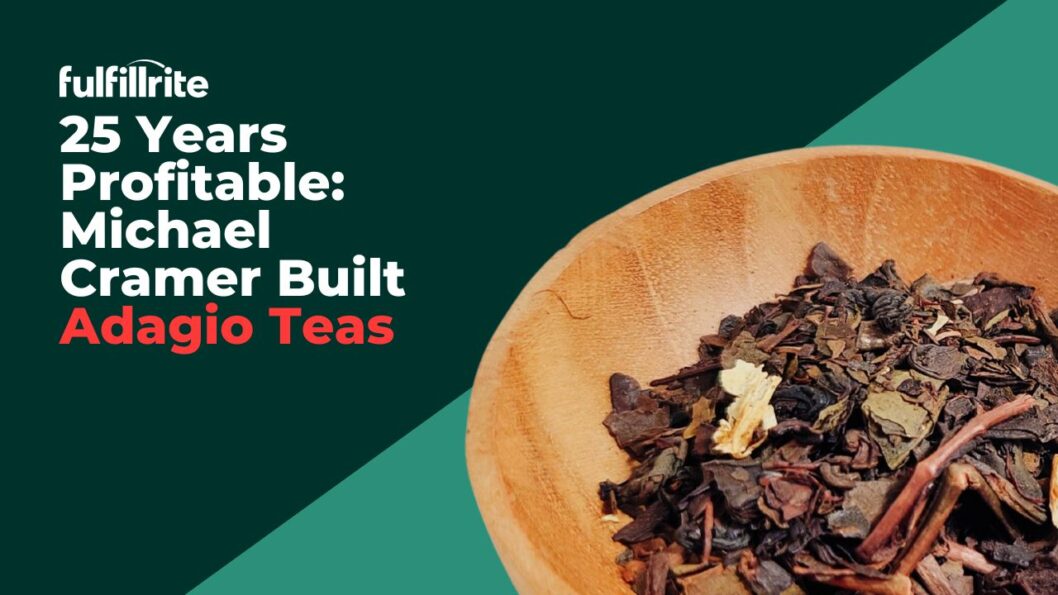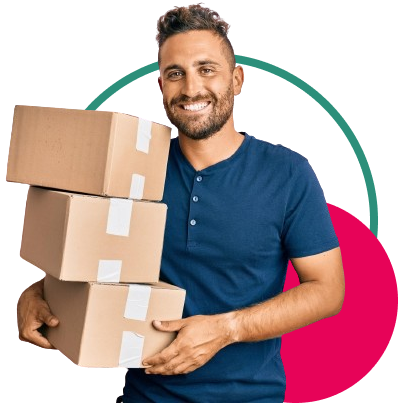Most startups don’t make it to year two. Even fewer turn a profit in year one. And almost none survive 25+ years while major competitors like Teavana shut down.
Michael Cramer’s Adagio Teas did all three.
In 1999, during the headiest days of the dot-com boom, Michael left investment banking. It was then that he went on to co-found a loose-leaf tea company with his mother and brother. They operated out of a basement with minimal overhead and sold directly to customers via a then-emerging channel called eCommerce.

They were profitable from year one.
Today, Adagio serves over a million customers from facilities in New Jersey, California, and the UK. Their store boasts more than 100 types of tea sourced directly from farms of origin.
The company created the ingenuiTEA self-filtering teapot, pioneered a $2 sample program that prioritizes lifetime value over average order value, and built a business model that balances curated quality with customer customization.
They survived the shift from pure eCommerce to omnichannel retail, maintained direct relationships with tea farmers across Asia, and outlasted better-funded competitors.
This is the story of how a Russian immigrant with an MBA and banking experience built a family tea business that’s thrived for over two decades by honoring the leaf, listening to customers, and playing the long game.
Russian Tea Culture Meets Dot-Com Boom
Michael Cramer grew up in Moscow where tea wasn’t just a beverage. It was a ritual, a way to pause, reflect, and connect. “Tea was woven into my childhood and cultural identity,” he explains. “In our household, it wasn’t just a beverage but a ritual, a way to pause, reflect, and commune.”
Even though much of Russian and post-Soviet tea culture relied on tea bags or strong black blends, Michael developed an early sensitivity to quality, subtlety, and the story behind a cup. Later, when he lived abroad, he encountered loose-leaf teas with their depth, aroma, and diversity.
That’s when he realized something: “There was a kind of ‘missing link’ between that richness and what many people in the U.S. had access to.”
Michael’s mother had long nurtured this passion for tea, serving special blends to guests and experimenting with flavors. When Michael and his brother were grown, they saw an opportunity. The Internet in the late 1990s unlocked a chance to bring better teas to people everywhere, not just locally.
“I see the seed of the business in a fusion,” Michael says. “Cultural memory + a gap in the U.S. market + the emerging power of eCommerce at the time.”
But Michael wasn’t a tea merchant. He was an investment banker with an MBA from INSEAD. Walking away from finance to start a tea company felt risky.
“The idea of building something real, tangible—tied to nature, culture, human connection—was more compelling to me than financial markets,” he explains.
In 1999, Michael, his mother, and his brother co-founded Adagio Teas. The name comes from the Italian musical term meaning “slow” or “at ease”—representing tranquility and the philosophy of savoring rather than rushing.
How Adagio Teas Turned A Profit on Year One
First-year profitability is remarkable for any startup. For an eCommerce business launched in 1999, it’s especially remarkable. Michael attributes it to a mixture of factors.
They started lean and operated from home, later from a basement, with minimal fixed costs. No expensive office space, no large team, no investor pressure to spend fast and scale faster.
They differentiated fast. Even with limited selection early on, their teas were fresher and more flavorful than many competitors. That quality let them command higher margins. Consumers had few alternatives for gourmet loose-leaf tea in 1999. Adagio was filling a genuine gap in the market.
Adagio also started selling directly before that was commonplace. By leveraging the emerging Internet, they cut out middlemen and reached customers directly with less margin leakage.
They were also nimble too. Decision-making was fast, capital was committed, and they didn’t have to prove anything to external investors. That freedom let them iterate quickly.
Michael’s banking background provided critical advantages: “Discipline, financial rigor, risk assessment, structuring operations, capital management, negotiating, forecasting. It gave me a language for scaling, for understanding margins, for making prudent investments.”
But that background also came with habits he had to unlearn.
“In finance, speed, shortcuts, and abstractions sometimes trumped patience and craftsmanship,” Michael admits. “Transitioning to a business rooted in agriculture and product required humility, openness, and respect for cycles. Overall, the skill set from banking gave me a foundation; but tea taught me patience, listening, and that sometimes slower is wiser.”
That philosophy—adagio, at ease, unrushed—became central to how the business operated.
“We view ‘adagio’ not as slowing everything down, but as creating space for intention, thoughtfulness, and savoring,” Michael explains. “In operations, that means choosing quality over mere speed: ensuring freshness, careful handling, honoring the journey from farm to cup. We don’t rush the leaf.”
Building Direct Relationships With Farmers
Early on, Adagio sourced tea through intermediaries. But Michael quickly realized that freshness, trust, and knowledge of provenance demanded closer ties.
“We began traveling, visiting auctions, meeting brokers, then meeting farmers directly in Asia,” he says. “Over time, we cultivated partnerships built on respect, transparency, and mutual benefit.”
His INSEAD education proved invaluable here. The business school’s global emphasis exposed him to diverse cultures, international negotiation, and cross-cultural management.
“When we began forging relationships with tea growers across Asia, that mindset of cultural humility, listening, adapting, and bridging different expectations was essential,” Michael explains. “I could more confidently engage in dialogues, assess risk in currency, logistics, quality, and also empathize with counterparts whose context was foreign to me.”
Today, Adagio’s supply chain follows a clear path:
- Direct negotiation/contract with farmer or small estate – setting quality, price, volume, delivery timing
- Harvest/processing oversight/sampling – when possible, sampling in-region, third-party tastings, or sending team members
- Export/shipping/quality control – dealing with customs, logistics, ensuring leaves are handled well
- In-house testing/grading/blending – further inspection, grading, blending, packaging
- Warehousing/distribution/fulfillment – from NJ/CA/UK facilities to customers or retail partners
“We view the relationship as ongoing collaboration, not transactional,” Michael says. “We want to invest in quality, consistency, and transparency so both sides benefit.”
This direct sourcing model also enables something most tea companies can’t offer: traceability. Customers can trace their teas back to the farms of origin—seeing which farm, which harvest, and understanding the story behind their cup.
Responding to Pain Points
Michael describes high-end tea as “like the new wine” with different varietals despite coming from the same plant. Tea is highly sensitive to region, altitude, soil, climate, harvest time, and processing. Even leaves from the same plant can yield dramatically different cups.
But there was a problem: loose-leaf tea intimidated many customers. From their perspective, it seemed messy, complicated, and time-consuming.
So to respond to this pain point, Adagio introduced the ingenuiTEA. It’s a self-filtering transparent teapot that solved the “loose leaf is messy” problem.
After steeping leaves in boiled water, you place the pot on a mug, and a filtering system drains brewed tea into the cup through a valve. The gravity-based design uses no force to strain leaves, unlike French press teapots that crush and bruise them.
“Product ideas like ingenuiTEA are responses to those frustrations,” Michael explains. “At the same time, we see ourselves as educators. Some customers don’t even know better brewing is possible. So when we design a tool, we also provide supportive content, demonstrations, usage tips, and context so people appreciate why it’s better.”
The approach to product development blends customer empathy with education: “We listen closely to customer pain points. But we also educate the market on better ways to brew. We test prototypes, collect feedback, refine—often launching tools in small batches before scaling.”
Beyond tools, Adagio offers over 100 types of tea plus the ability for customers to create custom blends. Balancing curation with customization required thoughtful design.
“We see curation and customization as complementary,” Michael says. “Too much freedom without guidance can overwhelm consumers; too strict curation can feel restrictive.”
Their approach includes highlighting curated bestsellers as entry points, filtering by taste profiles, safe sampling with small purchases, custom tools with guardrails, and community feedback through user ratings. The “Signature Blend” program lets customers create blends, share them, and allow others to buy them.
“We provide structure, suggestions, and boundaries—but let motivated customers explore within them,” Michael explains.
The $2 Sample Strategy
In a world obsessed with maximizing average order value, Adagio does something counterintuitive: they sell samples for $2, making it low-risk to try new teas.
“We believe that lowering the barrier to trial is a powerful driver of trust and long-term loyalty,” Michael says. “When someone is hesitant to commit to a full size, a $2 sample gives them confidence. If they like it, they’ll come back and buy full amounts (often multiples), and they may try additional teas.”
The sample program helps with customer acquisition, reduces returns and dissatisfaction, enables cross-selling and exploration, and increases lifetime value.
“Though sample sales don’t maximize gross per order, they maximize the funnel, retention, and long-term margins,” Michael explains. “It’s a long-term mindset over short-term lift.”
Expanding Into Physical Retail
Adagio started as pure eCommerce in 1999, later expanded to retail partners like Bed Bath & Beyond and Amazon, then opened three company-owned retail locations in Chicagoland.
The move into physical retail was driven by several factors:
“Brand experience matters: tea is sensory,” Michael explains. “A store lets customers smell, taste, touch—creating deeper connection than a screen can. Discovery and trust: for many consumers, walking into a shop validates the brand and encourages trial.”
Physical presence also creates omnichannel synergy. Stores reinforce online and vice versa.
What they learned from retail surprised them. Customers linger—averaging 30 minutes in-store with an average transaction of $26. Staff must be trained and passionate, becoming brand ambassadors.
Inventory, displays, and lighting matter for converting walk-ins. Location is critical. And retail doesn’t substitute for eCommerce—margins, staffing, and real estate costs require disciplined operations.
Michael views location-based marketing and digital acquisition as complementary. For physical stores, local targeting through geofencing and services like Foursquare can drive awareness.
Adagio experimented with Foursquare ads and achieved a 360% ROI. The long dwell-time and solid average transaction reflect that once people are physically present, they value the experience.
For eCommerce, digital acquisition gives scale and reach beyond geography. But converting digital visitors requires higher trust, content, social proof, and low-risk entry—like those $2 samples.
“Local marketing brings people into immersive experiences; digital marketing scales reach,” Michael says. “Both feed into the same customer funnel.”
Scaling Infrastructure
As Adagio grew from a basement operation to serving over a million customers, infrastructure expansion became necessary. Today they have facilities in New Jersey, California, and the UK.
Michael outlined five reasons why they ultimately expanded their footprint:
- Geographic delivery delays. Shipping from just one coast produced poor transit times to distant customers. Regional fulfillment maintained service levels.
- Volume growth spikes and seasonal surges. They needed buffer capacity and multiple sites to manage risk and overflow.
- International markets. The UK facility allowed faster delivery in Europe and better handling of cross-border operations.
- Product line expansion. Adding teaware, tools, and heavier SKUs increased logistics demands.
- Redundancy/resilience. Multiple sites mitigated risks from natural disasters, port disruptions, and local constraints.
“Those inflection points were often driven by customer expectations, cost pressures, and the imperative to maintain quality and freshness even as scale increased,” Michael explains.
The Secret to Longevity
Adagio has survived and thrived for 25+ years while competitors like Teavana shut down. What’s the secret?
“Mission-led consistency,” Michael says. “We never lost sight of why we exist—delivering great tea, honoring the leaf, building trust.”
Other factors include relentless customer focus, balanced innovation and discipline, sustainable partnerships with farmers and suppliers, and treating brand as a long game rather than chasing short-term promotion.
The tea market has evolved dramatically since 1999:
Tea has shifted from commodity to craft/specialty. Consumers now care about origin, processing, micro-lots. Tea appreciation has become more experiential—tastings, subscriptions, ritual, education.
Digital acceleration means eCommerce, social media, and data-driven personalization are now standard. Tea tools and accessories have gained sophistication. And sustainability, transparency, and ethical sourcing have become table stakes in specialty tea.
“Over the years, the ones who survived (including us) are those who adapted—but without losing their foundational values,” Michael reflects.
That balance between adaptation and consistency is what separates businesses that last from those that flame out. Adagio adapted their business model from pure eCommerce to omnichannel retail. They innovated with products like ingenuiTEA and custom blending. They expanded infrastructure across three countries.
But they never lost sight of the core mission: delivering great tea, honoring the leaf, building trust with customers and farmers, and creating space for people to slow down and savor.
Twenty-five years after leaving investment banking to sell tea from a basement, Michael Cramer has built something rare: a profitable, sustainable family business that serves over a million customers while staying true to the values that inspired it in the first place.
You can explore Adagio’s full collection of loose-leaf teas, learn about the ingenuiTEA brewing system, or find their locations and products at Adagio.com.
Key Takeaways
First-year profitability was only possible because they stayed lean.
Operating from a basement with minimal overhead, cutting out middlemen through direct eCommerce sales, and having family alignment for fast decisions are all the kinds of advantages that let Adagio turn profitable immediately when most startups burn cash for years.
Financial skills alone are not enough to build a business.
Michael’s investment banking background provided discipline, financial rigor, and risk assessment skills. But he had to unlearn the speed and shortcuts of finance to embrace patience, craftsmanship, and agricultural cycles that tea demanded.
Direct farmer relationships require cultural humility.
INSEAD’s global emphasis prepared Michael for cross-cultural negotiation with tea farmers across Asia. Building partnerships based on respect and transparency, not transactional relationships, created sustainable supply chains that lasted decades.
Lower barriers to trial, maximize lifetime value.
The $2 sample program seems counterintuitive when everyone else maximizes average order value. But reducing friction for trial builds trust, reduces returns, enables exploration, and dramatically increases customer lifetime value and retention.
Innovation solves real pain points first, and educates second.
The ingenuiTEA teapot responded to “loose leaf is messy” customer frustration. But Adagio also educated customers on why better brewing matters, combining customer empathy with market education rather than just responding to stated needs.
Physical and digital retail are complementary.
Moving from pure eCommerce to retail partners to company-owned stores created omnichannel synergy. Local marketing (360% ROI on Foursquare ads) brings people into immersive 30-minute experiences; digital marketing scales reach. Both feed the same funnel.
Lasting a long time requires you to adapt while still staying true to your values.
Surviving 25+ years while Teavana shut down required adapting business models, innovating products, and expanding infrastructure. But Adagio never lost sight of core mission: delivering great tea, honoring the leaf, building trust. Adaptation with consistency beats rigid adherence or aimless pivoting.

